【最新】牛津译林版八年级英语上册Unit8 Natural disasters 单元综合测试(附答案)
江苏省八年级上册Unit8Naturaldisasters主题写作牛津译林版
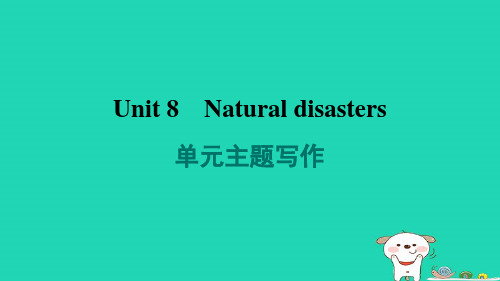
were not any houses at all. There were only pieces of glass
and bricks everywhere. We felt very sad.
(二)描写自然灾害的常用句型:
An earthquake hit ...
The weather was ...
I was doing ...
... when ...
We could only hear / see ... Suddenly, ...
... kept falling. ... was very terrible.
三、素材积累 (一)描写自然灾害的常用词汇: earthquake//flod//storm//snowstorm//fire... hit//happen//wash away//kil/come down//fall down//catch//shake //be trapped// scream//move away... terrible//heavy//afraid//dark//silent//nervous//alive//safe// exc以“A Landslide(滑坡)”为题,写一篇
70词左右的短文(开头已给出,不计入总词数)。 要点:1.上周一早上,在连续下了两天大雨之后发生了
滑坡。 2. 我和妈妈在家,爸爸下午回来。雨很大。他叫我和
妈妈赶快带伞离开。 3. 就在那时,房子……,我们非常……,迅速…… 4. 第二天上午回家时,我们发现……,到处是……,
我们感到……
A Landslide
Last Monday morning, after two days’ heavy rain, a
【最新】牛津译林版八年级英语上册《Unit8 Nature disasters》(Reading 2)2 精品课件

shake
shake,shaking(n) shake (v) shook I felt a slight shake. The earth started to shake.
Read and complete
try one‟s best todown
shake
in all directions
shaking The earthquake is terrible. The earth is _______.The noise is like bombs. The bricks are falling down. all directions People are_______. ___________. in fear They are running in trapped If After the earthquake lots of people are __________. you are trapped, remember ____________. to calm down Wait for your best to stay alive. When you believe, help. Try ____________ there can be miracles(奇迹).
Answer the questions
After the earthquake Paras(3-5)
He was in the dark. He was trapped.
5. Where was Timmy when the shaking ended? 6. How did Timmy feel? He felt nervous . He was in fear (frightened)and then calm. A moment of fear went through his mind but he told himself to calm down.
最新牛津译林版中学八年级英语上册 Unit 8 Natural disasters Reading 1教案

Unit 8 Natural disastersTeachingaims 1. To guess general meanings from keywords and context 2. To skim text for overall meanings and scan for detailsTeaching focus 1.To va lue students ’ ability of reading2.To educate students to be careful with disasters like fire .Difficult points To develop the ability to infer the general meaning from title and context.Teaching methodbased approach-Task Teaching proceduresThe seco nd preparing lessonsStep1.Revision1) Introduction:We learnt something about natura l disaster last time. What disaster have we learnt? 2) Students discuss in p airs. Step2.Presentation.Use students ’ answer to discuss an earthquake. For example:Where does it usually happen?How do people feel when it happens?Step3.Read the passage about “The Taiwan Earthquake ” pay attention to the following questions:When the earthquake happened, What was I doing? Why did people scream? Did the writer survive? Stpe4.Presentation.1) Read the passage themselves. 2) Repeat after the tape.3) Have diff iculties to explain. be trapped=be in trouble 陷入困 at first=at the begi nning 在开始a loud noise like thund er 像雷声一样的声音 in fear 恐惧be frightened 害怕in all directions 四面八方 run wildly 拼命地跑try one ’s best to do sth=do one ’s best to do sth 尽力做某事 pieces of glass 玻璃片 calm down 冷静下来 be over,结束 say to oneself 自言自语课 题 Reading 1总第 课时 备课时间 上课时间课 时Period 2 教 具A recordershout for help喊救命in a great hur ry急匆匆move away搬look at each other in fear恐惧地对看着do some shopping买东西 stay alive活着 go through my mind闪过头脑Sentences: I was doing my homework when it started.I didn’t know if anyone was around me.I didn’t know where I was.Some people screamed because they were very frightened.People were runn ing wildly while pieces of glass and brickswere falling down.They didn’t know where to go.Some people ran out of the shopping centre.I thought somebody could hear me but no one came for a longtime.I was trying to find my way out when I suddenly heared somenoise above me.Step5.Consolidation.1).Read the passage again.2).Give students some key words, and ask them to retell the story if time permitted.Step6.Home work:Teachingnotes。
牛津译林版英语八上 Unit8 Natural disasters

8A Unit8 Natural disasters易错题回放( )1. Every year, __ tourists come to Lishui when the Strawberry Festival comes.A. thousandB. thousand ofC. thousands ofD. thousands( )2.—Our teacher fell off his bike and hurt his leg.—.A. Never mindB. He was so careless.C. He should be careful.D. I'm sorry to hear that.( )3. When does your school__________?A. overB. finishesC. endD. begins( )4. Tom’s eyesight is poor too homework at night.A. because of, manyB. because of, muchC. because, manyD. because, much ( )5. I didn’t know if _____ was around and I felt ______.A. someone, frighteningB. someone, frightenedC. anyone, frighteningD. anyone, frightened( )6. He tried to make himself __________ when he saw the wolf.A. come downB. calm downC. to come downD. to calm down目标描述:重点词组:1.mop up…2.wash…away3.catch fire4. crash into5.in fear6. run in all directions7.a loud noise like thunder 8. start to shake9. come down 10. not…at all11. beat fast 12. say to oneself13. calm down 14. be trapped15. a moment of fear 16. find one’s way out17. hear shouts from excited people 18. break down19. because of 20. on the side of the road21. as…as possible 22.protect oneself from23.follow traffic rules 24.nearly fall over三、重点句型:1. I was sleeping when the earthquake started.2. People were running in all directions while pieces of glass and bricks were falling down.3. I felt nervous and my heart was beating fast.4. As I was trying to find my way out, I suddenly heard some noise above me.5. I was(not) sleeping at 10 p.m. last night.6. When/While/As Millie was watching TV, Andy came into the room.四、重点语法1. 过去进行时的用法2.while /when/as:都可以做时间连词,当一个较短的行为与一个较长的行为同时发生时,短的行为用一般过去时,长的行为用过去进行时。
最新牛津译林版初二英语上册8A Unit 8 Natural disasters Grammar 八年级PPT课件
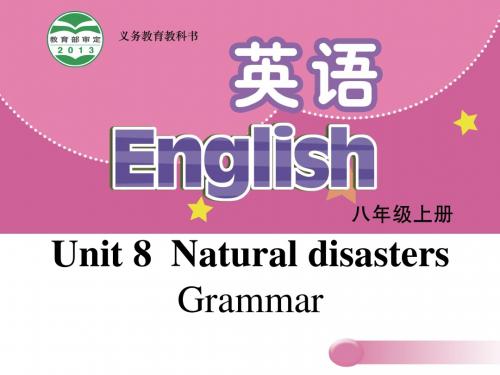
Lead-in
The past continuous tense
过去进行时
Discovering
What’s the rule?
◇Look at the sentences. He was watching TV at nine yesterday. We were sleeping when you came. She was cooking dinner at that time. They were playing football that afternoon. You were reading when the telephone rang. I was washing my car at this time yesterday.
Communication show
Complete a conversation
◆Complete Part A on Page 97
Practice
1. —Was Kate at the party last night? —Yes, she _____ a really nice dress. (2013· 盐城市) A. is wearing B. was wearing √ C. would wear D. has worn 2. Millie ____ a picture when Mr Green came in. (2013· 徐州市) A. draw B. will draw C. drew D. was drawing √
Discovering
Use the rule!
◇Circle the right verb.
At this time yesterday, she is reading/was reading in the study. What were you doing/did you do at nine o’clock last night? I am chatting/was chatting online with my friends when he came.
牛津译林版八年级上册英语Unit 8 Natural disasters Reading知识点总结讲
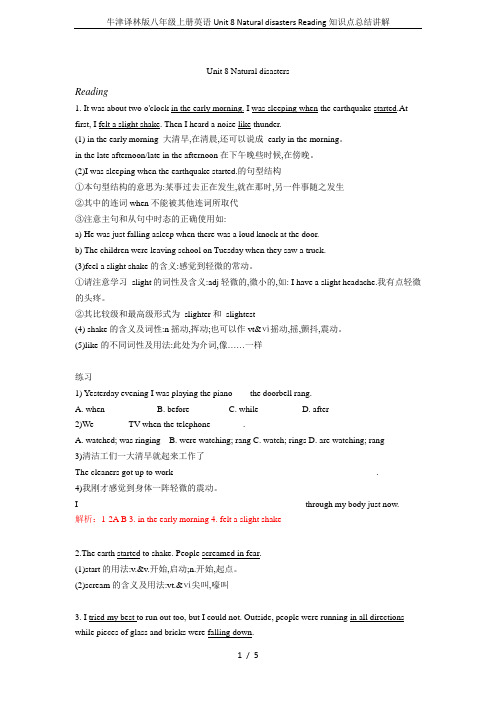
Unit 8 Natural disastersReading1. It was about two o'clock in the early morning. I was sleeping when the earthquake started.At first, I felt a slight shake. Then I heard a noise like thunder.(1) in the early morning 大清早,在清晨,还可以说成early in the morning。
in the late afternoon/late in the afternoon在下午晚些时候,在傍晚。
(2)I was sleeping when the earthquake started.的句型结构①本句型结构的意思为:某事过去正在发生,就在那时,另一件事随之发生②其中的连词when不能被其他连词所取代③注意主句和从句中时态的正确使用如:a) He was just falling asleep when there was a loud knock at the door.b) The children were leaving school on Tuesday when they saw a truck.(3)feel a slight shake的含义:感觉到轻微的常动。
①请注意学习slight的词性及含义:adj轻微的,微小的,如: I have a slight headache.我有点轻微的头疼。
②其比较级和最高级形式为slighter和slightest(4) shake的含义及词性:n摇动,挥动;也可以作vt&ⅵ摇动,摇,颤抖,震动。
(5)like的不同词性及用法:此处为介词,像……一样练习1) Yesterday evening I was playing the piano____the doorbell rang.A. whenB. beforeC. whileD. after2)We _______ TV when the telephone _______.A. watched; was ringingB. were watching; rangC. watch; ringsD. are watching; rang3)清洁工们一大清早就起来工作了The cleaners got up to work ______________________________________________.4)我刚才感觉到身体一阵轻微的震动。
最新牛津译林版八年级英语上册 Unit 8 Natural disasters Reading精品课件
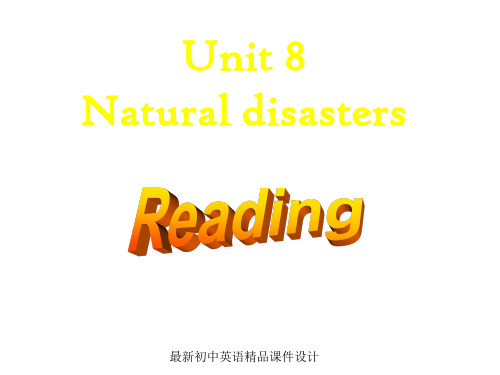
paragraph 2 Complete the passage. The real noise was like _b_o_m_b__s under the ground. People ran _in__a_ll_d__ir_e_c_ti_o_n_s_. Timmy tried his best to _r_u_n_o_u_t_ to the street. Pieces of glass and bricks w__e_r_e_f_a_ll_in_g__d_o_w_n__, and then the walls began to _c_o_m_e__d_o_w_n_, too.
When it was
What he did What he heard How he felt
At first
About two o’clock in the early morning.
He was sleeping. He heard a loud noise like thunder. H最新e初f中el英t语a精s品li课g件h设t 计shake.
最新初中英语精品课件设计
Timmy put some pictures he drew on his web page. Help Sandy write the correct caption in the blank under each picture. Then put the pictures in the correct order on page 95.
directions …. run in all directions 跑向四面八方
e.g. The enemy began to run away in all
【最新】牛津译林版八年级英语上册Unit8《Natural disasters》Task 精品课件(共28张PPT)

Friday, 5th January at school, told---to go home
Read the Sandy’s notes.
I was doing my homework in the classroom and Mr Wu told us to go home early.
I shared an umbrella with Millie.
After the disaster / accident
Which is useful for you? Choose them out !
1.What did you do? 1.wore more clothes / rain coat / glasses 2.called 110 / 119 / 120 hotline 3.closed the door and windows 4. went to high places--2.heard strong wind / big noise/ thunder 3.saw the lightning / lots of smoke / sand / dark cloud / thick snow/ many people--4. What happened ? 1.be trapped / be frightened 2. lost my umbrella 3.walked / drove / rode---slowly / hard 4.fall down / over 5.crashed into--5.How did you feel? 1.frightened / excited / terrible/ in fear/worried/sad--2.screamed / shouted / calmed down---
牛津译林版英语八上 Unit 8 Natural disasters

8A Unit 8 Natural disastersPeriod3(ReadingⅡ)一、词组翻译1.像打雷的巨大噪声____2.惊恐地尖叫着3.足够的空间__ ____4.尽力向外跑_______5.玻璃和砖头碎片____6.倒下来__________7.寻找出路_ _ ___ 8.陷入困境___9.听到人们兴奋的喊叫__________________ 10.看到明亮的日光二、词汇运用1. There are all kinds of thoughts running through my_________(头脑)now.2. I was frightened, but I told myself to _______(冷静)down.3. _________(由于)you are now here.I will make Max show you around our work place.4. They dropped hundreds of__________(炸弹)on the city.5. Please hold on for a__________(片刻).My father is coming to answer you.6. Do not always keep_________(沉默的)in class,you should be more active.7. Liu Xing heard a _______(loudly) and strange noise.8. The _______(exciting) people all stood up and cheered for Lin Dan.三、单项选择( )1._______you don’t like the bike,you should not buy it.A.With B.But C.So D.Since( )2.Don’t make any_______.Your father is writing in the next room.A.noist B.voice C.sound D.shout( )3.I'm_________you should come here before eight o'clock tomorrow morning.A afraid B.happy C.worried D.excited( )4.At that time I didn’t even know_________.A.where am I B.I am where C.where was I D.where 1 was( )5.Some animals are able to______alive,________eating any food in winter.A.become;not B.turn;no C.stay;without D.keep:not( )6.Let’s_______ the big stone,or there may be a traffic accident。
牛津译林版八年级上册Unit 8《Natural disasters》(Task)教学设计

牛津译林版八年级上册Unit 8《Natural disasters》(Task)教学设计一. 教材分析牛津译林版八年级上册Unit 8《Natural disasters》主要介绍了自然灾害,包括地震、洪水、台风等,通过学习本单元,学生可以掌握有关自然灾害的词汇和表达方式,了解自然灾害发生的原因及应对措施。
Task部分要求学生阅读一篇关于自然灾害的文章,然后进行相关练习,培养学生的阅读能力和解决问题的能力。
二. 学情分析八年级的学生已经具备了一定的英语基础,能够进行简单的阅读和交流。
但部分学生在阅读长篇文章时,可能会遇到生词和语法难题,影响阅读理解。
此外,学生对于自然灾害的了解程度不一,需要教师在教学中进行引导和补充。
三. 教学目标1.知识目标:学生能够掌握有关自然灾害的词汇和表达方式,了解自然灾害发生的原因及应对措施。
2.能力目标:学生能够阅读并理解关于自然灾害的文章,提高阅读能力;通过任务型教学,培养学生的解决问题能力。
3.情感目标:培养学生关爱生命,关注自然的意识,提高学生应对自然灾害的能力。
四. 教学重难点1.重点:学生能够掌握有关自然灾害的词汇和表达方式,阅读并理解关于自然灾害的文章。
2.难点:学生能够运用所学知识,解决实际问题,提高应对自然灾害的能力。
五. 教学方法1.任务型教学法:通过任务型教学,让学生在实践中掌握知识,提高能力。
2.情境教学法:创设情境,让学生在真实的环境中学习,提高学生的学习兴趣。
3.合作学习法:引导学生进行小组合作,培养学生的团队精神和沟通能力。
六. 教学准备1.教师准备:提前准备关于自然灾害的文章,整理相关词汇和表达方式,设计任务型练习。
2.学生准备:预习课文,了解自然灾害的基本知识,准备参与课堂活动。
七. 教学过程1.导入(5分钟)教师通过提问方式引导学生谈论自然灾害,激发学生的学习兴趣。
例如:“你们知道哪些自然灾害?它们发生的原因是什么?”2.呈现(10分钟)教师呈现关于自然灾害的文章,让学生快速阅读,了解文章大意。
新版牛津版八年级英语上册Unit8Naturaldisasters词汇与语法基础训练含答案
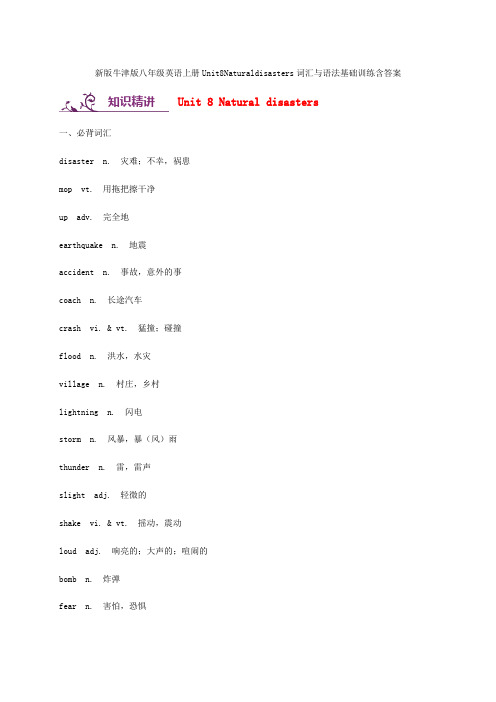
新版牛津版八年级英语上册Unit8Naturaldisasters 词汇与语法基础训练含答案一、必背词汇disaster n. 灾难;不幸,祸患 mop vt. 用拖把擦干净 up adv. 完全地 earthquake n. 地震 accident n. 事故,意外的事 coach n. 长途汽车crash vi. & vt. 猛撞;碰撞 flood n. 洪水,水灾 village n. 村庄,乡村 lightning n. 闪电 storm n. 风暴,暴(风)雨 thunder n. 雷,雷声 slight adj. 轻微的 shake vi. & vt. 摇动,震动 loud adj. 响亮的;大声的;喧闹的 bomb n. 炸弹 fear n. 害怕,恐惧Unit 8 Natural disasters知识精讲direction n. 方向brick n. 砖,砖块silent adj. 寂静的nervous adj. 紧张不安的heart n. 心脏beat vi. & vt. (使)规律作响,作节奏运动trapped adj. 困住的mind n. 头脑calm vi. & vt. (使)平静,(使)镇定since conj. 由于,既然still adv. 仍然alive adj. 活着的dark n. 黑暗shout n. 呼喊,喊叫声safe adj. 安全的asleep adj. 睡着的break vi. 损坏;打破towel n. 毛巾,浴巾rule n. 规则railway n. 铁路pancake n. 烙饼,薄饼burn n. 烧伤,烫伤,灼伤board n. 木板headache n. 头痛toothache n. 牙痛countryside n. 乡下, 农村nearly adv. 几乎,将近clear vt. 清除,清理shaking n. 摇动,震动二、重点词汇1. break verb /breɪk/1). to (cause something to) separate suddenly or violently into two or morepieces, or to (cause something to) stop working by being damaged 破碎,破裂;打破;打断;损坏,弄坏例句:The dish fell to the floor and broke.碟子掉到地上摔碎了。
新牛津译林版八年级英语上册 Unit 8 Natural disasters

Unit 8 Reading【Analysis of teaching material】The Two reading paragraphs are excerpted from Robinson Crusoe which is written by Daniel Defoe and introduces Robinson’s youth and the time up to his shipwreck, his 28 years on an uninhabited island,his life and adventures after being rescued from the island.The first paragraph is about Robinson’s life and inner his feeling after he first arrived on the island, and the second paragraph mainly talks about the story between Robinson and Friday.【Teaching aims】1.Students master some key words and phrases.2.Students can improve their reading skills of scanning and skimming.3.Students can understand the present perfect tense in the passage4.Students can have awareness of never giving up in the face of difficulties.【Teaching key and difficult points】1.To improve students’ reading skills of skimming and scanning.2.To understand the present perfect tense in the passage.【Teaching method】3P【Teaching procedures】Step1: Lead-in1.Daily greeting to students.2.Check the homework3.Watch a short video and imagine what you will do if you are left alone on theisland? Wait for death or find ways to survive?4.What would you prepare to deal with the problems?Step2: Pre-readingLook at the picture, what can you know from the picture?Step3: Fast-readingRead and match the main idea with each paragraphStep 3: Careful reading1.Imagine what problems you may have if you were left alone on the island just like Robinson?2.Read para.1 and find what Robinson has done to deal with the problems?3.Read Para. 2 and complete the timelineStep 4: After reading1.What do you think of Robinson Crusoe?Robonsin is brave, creative, clever, optimistic and he is a ma full of wisdom and courage.2.What can we learn from Robinson Crusoe?●Never give up trying in the face of difficulties.●There are more ways than difficulties.●Learn the importance of life skillsLife is fine, and learn to enjoy it.3.Is there anyone who has the same spirit as Robinson?4.Robinson and Friday lived on the island for 28 years. Finally, they were saved by a ship passing by. Can you make up your end to the story?【Homework】Level 1:Tell the story of Robinson Crusoe to your friends after class.Level 2: Try to go on writing your own story of Robinson and share your story with us next class.【Blackboard design 】【Teaching reflection】In this reading class,individual learning and group cooperation are combined to promote to improve students’ reading skills, and in some ways stimulate learning motivation of students. However, as the reading passages in grade 8 are becoming more and more difficult,some students still don’t have the habit of previewing, so they can’t finish the reading tasks within limited time. Besides, some students are not able to understand the present perfect tense in the passage. Last but not least, the text analysis is not enough.。
最新【牛津译林版】八年级英语上册:Unit 8 Natural disasters Reading

Fourth reading
While-reading
Timmy’s different feelings in different time
How did Timmy feel?
◆I tried my best to run out too, but I could not. (Line 5) ◆I felt nervous and my heart was beating fast. (Line 11) ◆“I’m trapped,” I said to myself. (Line 11) ◆A moment of fear went through my mind, but I told
making no or little sound
Pocket dictionary
Pre-reading
◆slight adj. 轻微的 ◆shake nv..摇摇动动
◆bomb n. 炸弹
◆fear n. 恐惧
◆direction n. 方向 ◆brick n. 砖块
Who saved Timmy? ◆silent adj. 寂静的 ◆nervous adj. 紧张的
•
16、业余生活要有意义,不要越轨。2021/5/102021/5/10May 10, 2021
•
17、一个人即使已登上顶峰,也仍要 自强不 息。2021/5/102021/5/102021/5/102021/5/10
Key expressions
shake scream direction come down silent be trapped calm down at last safe
myself to calm down since I was still alive. (Line 12) ◆I shouted for help, but no one came. (Line 14) ◆I screamed, “Help! Please help! I’m here!” (Line 18) ◆At last, I saw the bright daylight. I was safe. (Line 20)
【最新】牛津译林版八年级英语上册Unit 8 Natural disasters Grammar 精品课件

2. 在过去某段时间一直在进行的动作
e.g. a) From 1983 to 1998, he was teaching
at Yale.
b) They were building a dam last winter.
Make sentences.
1. at 9 o’clock last Sunday 2. at this time yesterday 3. from 7a.m. to 6 p.m. last Monday 4. at that time • watch TV
She was drinking milk at this time yesterday.
She was playing computer games at that time.
He was reading newspaper from 10 to 11 yesterday morning.
Can you work out the rule?
They were doing morning exercises at 9:05 yesterday morning. They were playing basketball at this time last Sunday. He was drinking milk at this time yesterday.
Tom was playing football. What was Lucy doing at 2:30 p.m. yesterday?
Lucy was reading a book.
What were they doing from 6 to
8 last night? They were watching TV from 6 to 8. What were the twins doing at this time yesterday?
【最新】牛津译林版八年级英语上册Unit 8 Natural disasters 精品课件(共22张PPT)
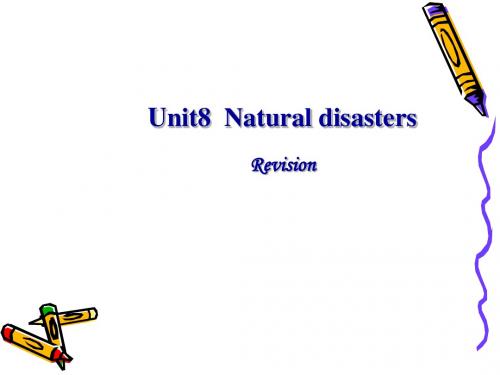
14.被困 15.自言自语 16.脑海里闪过一阵恐惧 17.冷静,镇静 18.还活ቤተ መጻሕፍቲ ባይዱ 19.呼喊救命 20.找到出路 21.成千上万的 22.冲走 23.听说 24.着火 25.出故障 26.因为,由于
14. be trapped 15. say to oneself 16. a moment of fear go through one’s mind 17. calm down 18. be still alive 19. shout for help 20. find one’s way out 21. thousands of 22. wash away 23. hear about /hear of 24. catch fire be on fire 25. break down 26. because of
27. wait for a taxi
the Taiwan earthquake
It was about two o’clock in the early morning. Timmy was sleeping when the a slight shake 一阵轻微的震动). Then he earthquake started. At first, he felt______________( heard a loud noise like thunder. bombs under the ground 地下的炸弹). The earth Soon the real noise came, like________________________( started to shake. People ________________( screamed in fear 惊恐地尖叫). Some ran out of the building. He tried his best to run out too, but he couldn’t. Outside, people were running______________ in all directions (四面八方) while pieces of glass and bricks were falling down. Then the walls began to ____________( come down 坍塌) too. Finally, the noise and shaking ended. It was dark and silent around him. He couldn’t see anything at all, and he didn’t know if anyone else was near him. He ____________( felt nervous 感到 was trapped 困住了). A moment of 紧张) and his heart was beating fast. He knew he ___________( went through his mind 掠过脑海), but he told himself to__________( fear ____________________( calm down 冷静) since he was still alive. He _______________( shouted for help 呼救), but no one came . He started to pull himself slowly through the dark. Luckily, there was just enough space for him to move. Hours later, as he was trying to _________________( find his way out 找到出路), he suddenly heard some noise above him. He screamed for help. Then he heard shouts from excited people. They quickly moved _____________________( away the bricks 把砖块搬走). At last, he saw the bright daylight. He was safe.
- 1、下载文档前请自行甄别文档内容的完整性,平台不提供额外的编辑、内容补充、找答案等附加服务。
- 2、"仅部分预览"的文档,不可在线预览部分如存在完整性等问题,可反馈申请退款(可完整预览的文档不适用该条件!)。
- 3、如文档侵犯您的权益,请联系客服反馈,我们会尽快为您处理(人工客服工作时间:9:00-18:30)。
Unit 8 Natural disasters单元综合测试Class_______ Name_______一、听力测试(10分)A)根据你所听到的对话,选择正确答案。
( )1. What's the matter with Daniel?A. A car hit him.B. A brick hurt him.C. A bike hurt him.( )2. What is the girl going to give to the children in disaster areas?A. Some money.B. Some books.C. Some clothes.( )3. How much is the man's mobile phone?A. 650 yuan.B. 750 yuan.C. 780 yuan.( )4. Who took the child out of the house?A. A fireman.B. His father.C. His neighbour.( )5. What are the children doing?A. They're watching TV.B. They're making a snowman.C. They're doing homework.B)根据你所听到的短文内容,选择正确答案。
( )6. How many people were there in the kitchen when the earthquake happened?A.One. B.Two. C.Three.( )7. Who was playing outside?A. The baby.B. The speaker.C. The speaker's brothers.( )8. What was the speaker doing?A. Sleeping in bed.B. Singing a song.C. Playing with the bird.( )9. What happened when the earthquake started?A. The mother screamed.B. The baby fell off the chair.C. The speaker ran to the kitchen.( )10. When did the earthquake stop?A. After the books fell to the floor.B. After the bird got out of his cage.C. After the family members got together.二、单项填空(15分)( ) 1. Mary advised that I should buy_______ iPad for my daughter as a birthday present.Young people are dreaming of owning_______.A. a; itB. a; oneC. an; oneD. an; it( )2.-Did you hear the cries_______ the boy?-Yes, when I arrived there, I found the boy looking at the snake_______ fear.A. from, inB. at, withC. from, withD. in, in( )3.The boy couldn't say a word after seeing the train accident. The policewoman triedto_______.A.calm down him B.calm him downC.calmed him down D.calmed down him( )4.We should make as_______ as possible.A.fewer mistakes B. few mistakesC.little mistakes D.less mistakes( ) 5. Every_______ thing needs air. Without it, nothing can keep_______.A. living, livingB. living, aliveC. alive, aliveD. alive, living( ) 6. The terrible earthquake hurt_______ people and_______ them got badly hurt.A. thousands of; two hundreds ofB. two hundred; two hundredsC. thousand of; two hundred ofD. thousands of; two hundred of( ) 7. The boy_______ from a wall and hurt his leg. He_______ very painful(疼).A. fell; fallB. fell; feltC. felt; fellD. fall; feel( ) 8. -Do you know where Judy is?-Not sure. But she_______ the students' homework when I met her this morning.A. read B was reading C. reads, D. will read( ) 9. I tried my best_______ the street.A. to run out B to run out to C. run out of D. run to out( ) 10. He didn't go climbing_______ the heavy rain.A. becauseB. because ofC. soD. /( )11. _______ you never met your new workmates before, I will introduce you first at party.A. WhileB. SoC. ButD. Since( )12. It was dark around me and I couldn't see anything_______.A. any moreB. at allC. as well D too( )13. Kate was not sure_______.A. that she should go through the third gateB. if she should go through the third gateC. which gate should she goD. she should go through the gate( )14. A sudden noise like bombs made all the birds_______.A. to fly in all directionsB. to fly in the directionC. fly in all directionsD. fly in all direction( )15. -How would you like your tea, Amy? -_______.A. Green, pleaseB. I like it very muchC. It tastes goodD. Thank you三、完形填空(10分)In the United States, Monday is the beginning of the workweek(工作周). It is the day most Americans like l . And it is certain that the day they like most is Saturday. Saturday is the 2 of the workweek, and it is the beginning of the weekend. Life is 3at weekends. Most Americans take care of their houses, cars or gardens. They 4 the feeling that time seems to move more slowly. The workweek is for things you have to do, but the 5 is for things you want to do. Some people may get in a car and go for a 6 in the country. They like to take part in outdoor activities. They 7 go to a public eating or a film on Saturday night. The 8 of weekends is a recent invention (近期的发明). In the 1870s, rich people began to speak of 9 weekends in the country visiting friends. For most people, however, the workday was six days 10 .( ) 1. A. most B. least C. more D. less( ) 2. A. end B. beginning C. middle D. starting( ) 3. A. terrible B. hard C. different D. same( ) 4. A. hate B. enjoy C. remember D. forget( ) 5. A. weekend B. weekday C. week D. workweek( ) 6. A. walk B. dance C. drive D. run( ) 7. A. must B. should C. need D. might( ) 8. A. day B. idea C. programme D. knowledge( ) 9. A. costing B. spending C. paying D. taking( ) 10. A. long B. short C. early D. late四、阅读理解(20分)(A)Sometimes your biggest weakness (弱点) can become your biggest strength (优势). Take the story of a girl who decided to study judo (柔道) despite(尽管)she lost her left arm in a car accident for example.The girl began lessons with an old Japanese judo teacher. The girl was doing well. So she couldn't understand why, after three months of training, the teacher taught her only one move."Teacher," the girl finally said, "Shouldn't I be learning more moves?"Not quite understanding, but believing in her teacher, the girl kept training. Months later the teacher took the girl to her first competition. Surprised herself, the girl easily won her first two matches. The third match was more difficult, but after some time, her opponent (对手) became impatient. The girl used her one move to win the match. Still surprised by her success (成功), the girl was now in the finals.This time, her opponent was bigger and stronger. The girl had a hard time and the referee (裁判) wanted to stop the match because he thought the girl might get hurt. But her teacher didn't agree. "Let her do it." her teacher said. Suddenly her opponent made a big mistake. The girl used her move to win the match again.On her way home, the girl and her teacher reviewed (回顾) every move in each match. Then the girl asked what was really on her mind."Teacher, how did I win the competition with only one move?""You won for two reasons," the teacher answered. "First, you've almost learned one of the most difficult moves in all of judo. Second, the only known defense (防卫) for that move is for your opponent to catch your left arm."The girl's biggest weakness became her biggest strength.( ) 1. The girl had learnt_______ before she went to the first competition.A. many skillsB. only one moveC. how to win the matchD. how to use her left arm( ) 2. How many matches did the girl have before she went into the finals?A. One.B. Two.C. Three.D. Four.( ) 3. The referee wanted to stop the final match because_______.A. he thought the girl broke the rulesB. he was afraid that the girl might get hurtC. the teacher of the girl asked him to do .soD. the girl was too tired( ) 4. The girl won the match because_______.A. she was the strongest in the matchB. other girls were much too weakC. she had the biggest strengthD. she had great skill and she lost her left arm( ) 5. What does the story tell us?A. One had better learn only one move about judo.B. You can win the match if you are lucky enough.C. Sometimes weakness can do good to us.D. Weakness will always become strength.(B)What are you going to do if you are in a burning house? How will you escape (逃离)? Do you know how to save yourself? Please read the following passage.Escaping a fire is a serious matter. Knowing what to do during a fire can save your life. It's important to know the ways you can use and show them to everyone in the family, such as stairways(楼梯)and fire escapes, but not lifts(电梯).From the lower floors of the buildings, escaping through windows is possible; learn the best way of leaving by windows with the least chance of serious injury(受伤).The second floor window is usually not very high from the ground. A person, hanging by the finger—tips will have a drop of about six feet to the ground. It is about the height of a man. Of course, it is safer to jump a short way than to stay in a burning building.Windows are also useful when you are waiting for help. Be sure to keep the door closed. Or smoke and fire may come into the room. Keep your head low at the window and make sure you get fresh air rather than smoke.On a second or third floor, the best windows for escape are those that open onto a roof(屋顶).From the roof a person can drop to the ground more safely. Dropping onto cement(水泥)might end in injury. Bushes and grass can help to break a fall.( )6. What may be the best title of Paragraph 2?A. Escaping a Fire.B. Knowing How to Save Your Life.C. The Ways You Can Use.D. Taking Escaping a Fire Seriously. ( )7. It is possible to escape through the windows_______.A. if there are some bushes on the groundB. if you are strong enoughC. if you live on a lower floorD. if you have a long rope( )8.Which of the following escaping ways is NOT right?A. You can escape though stairways.B. You can choose fire escapes.C. Escape from the windows that open onto a roof.D. Use a lift to come down at once.( )9. Open the window so that_______ if the building is on fire.A. you can get fresh airB. you can call for helpC. you can easily j ump offD. you can be seen first( )10.The best title of the passage isA. Escape from the WindowsB. Save Yourself in the Burning HouseC. Knowledge on FireD. Waiting for Help五、单词拼写(10分)1. Who ate______(完全地)my ice cream!1 wanted to give it to my sister!2. I enjoy the life in the_______(乡下).It makes me feel comfortable there.3. We were_______(清理)the classroom the whole afternoon.4. Our school is going to make some_______(规则)about what to wear at school. 5.May I know your_______(外孙)names?6. Jenny is_______(将近)as tall as her mother now. She is still growing.7. Don't put any cream on your_______(烧伤处)before going to see the doctor.8. -Where was your father when the earthquake happened?-Oh, he was_______. And even the noise couldn't wake him up.9. -What's wrong with your teeth?-I had a bad_______ after eating the candy. I need to see the doctor.10. -Honey, don't play with matches. They_______ fire easily.-Sorry, I won't, Mum.六、动词填空(10分)1. My mum wanted me to help her_______ (mop) the floor.2. They_______ (plan) their trip the whole night so they couldn't get up this morning.3. The number of rare cranes_______ (get) smaller if we keep doing nothing, isn't it?4. Mr Xiao_______ (read) in the library when I called him last night.5. The children_______ (carry) water for the old over there. You should help them.6. Try_______ (not think) too much of your points. Just do your best!7. -Your watch looks very beautiful. .-Thank you. My uncle_______ (send) it to me as a birthday present.8. It's really nice of you_______ (share) your umbrella with this little girl.9. Who_______ (make) breakfast for you every morning in your home?10._______ they_______ (cook) the birthday dinner for you between 18:00 and 20:00 last night?七、完成句子(10分)1.人们恐惧地尖叫,跑出了这着火的房子。
